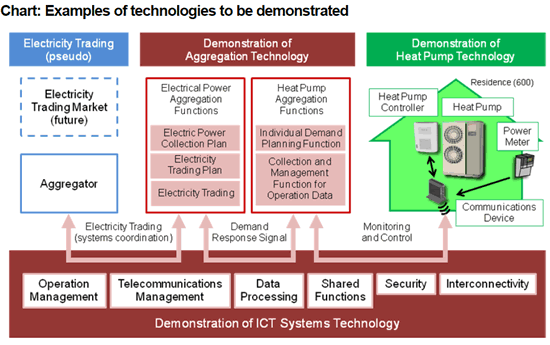Information contained in this news release is current as of the date of the press announcement, but may be subject to change without prior notice.
March 13, 2014
Tokyo, March 13, 2014 - Hitachi, Ltd. (TSE:6501/"Hitachi"), Daikin Industries, Ltd. (TSE:6367/"Daikin"), and Mizuho Bank, Ltd. ("Mizuho Bank") today announced that their consortium will commence the demonstration phase of the "Smart Community Project in Greater Manchester, UK." This project has been spearheaded by Japan's New Energy Development Organization ("NEDO"), with the consortium selected to execute the project.
The project has been planned based on a feasibility study implemented from June to the end of December 2013. The project will now move to a three-year demonstration phase running from April 2014 to the end of March 2017.
The project will see the delivery of Japanese cutting-edge technologies including heat pumps and ICT systems that will help to transform energy usage in the UK, and will demonstrate the use of technologies and systems that will contribute to the UK's transition to a low carbon society. As part of the feasibility study conducted from June to December 2013, the consortium conducted activities including the investigation of UK energy systems, and regulations, interviews of stakeholders including social housing corporations, and power distributors; and joint studies with local stakeholders. Accordingly, it has decided to commence the demonstration phase from April 2014.
In the demonstration phase, traditional gas-fired boilers of heating facilities in social housing will be replaced with electrical or hybrid heat-pumps, and an aggregation system*1 will be introduced to control the heat pumps in each social housing property. This will facilitate coordination of the electricity usage at each property. At the same time, the consortium will aggregate the coordinated electrical power and investigate the capacity to balance the power supply-demand dynamics of residential power users. Furthermore, hot water tanks will be installed with the heat pumps and residential heat retention functions to assess the impact on the capacity, thereby evaluating the feasibility of Demand Response (DR)*2. Through these activities, the aim is to demonstrate the feasibility of aggregation systems and establish the Electricity Aggregation Business Model for the residential sector.
Further details of the project as well as background information about the four participating companies can be found below.
In this demonstration, about 600 electrical and gas hybrid heat pumps will be installed in social housing properties with high thermal insulation as load-balancing capacity. During the feasibility study, it was confirmed via simulation that fuel cost might decrease when existing gas-fired boilers are replaced with electrical heat pumps under controlled conditions.
This project will develop an aggregation system consisting of two functions: heat pump aggregation functions, which balance the load of the heat pumps; and electrical power aggregation functions, which aggregate the load-balancing capacity from the heat pumps for trading in the electricity trading markets.
The heat pump aggregation functions provide the load-balancing capacity from heat pump groups by remotely controlling heat pumps, while maintaining consumers' comfort. Through these functions, the project will evaluate the impact of external factors such as home thermal insulation properties, and consumer attributes such as family structure and lifestyle patterns, on power consumption and the balancing of power supply-demand dynamics.
The electrical power aggregation functions aggregate the load-balancing capacity from heat pumps for trading in the electricity trading market or with electricity traders bilaterally. The demonstration will develop a system to coordinate the project with existing aggregators, and will use pseudo trading, which does not require payments between the parties.
The ICT systems have functional structures that can realize the aggregation functionalities and meet UK security and telecommunication standards. Hitachi will also develop and evaluate the real-time data processing, reliability, and scalability of the ICT system.
The feasibility study, proposed schemes which enable win-win relationships between electricity trading market participants, heat pump vendors and power aggregators in the UK, based on the assumed market penetration curve for heat pumps. Looking ahead, during or after the demonstration, the consortium will investigate the Electricity Aggregation Business Model using heat pumps, and set out to popularize and expand the heat pump aggregation business. Furthermore, a scenario for popularizing heat pumps will be proposed, alongside public policies that support this goal.

Hitachi, Ltd. (TSE: 6501), headquartered in Tokyo, Japan, is a leading global electronics company with approximately 326,000 employees worldwide. The company's consolidated revenues for fiscal 2012 (ended March 31, 2013) totaled 9,041 billion yen ($96.1 billion). Hitachi is focusing more than ever on the Social Innovation Business, which includes infrastructure systems, information & telecommunication systems, power systems, construction machinery, high functional material & components, automotive systems and others.
For more information on Hitachi, please visit the company's website at http://www.hitachi.com.
Daikin Industries, Ltd. (TSE: 6367) is a global leader in the market of residential, commercial and industrial use air conditioning systems, with a well-established presence in Japan, China, Southeast Asia, Europe, and North America. The company is also one of the leaders in the fluorochemicals industry. Across the entire Daikin Group, the company employed a staff of over 51,000 employees. The company ended financial year 2012 with a consolidated net sales of 1290.9 billion yen. For more information, please visit http://www.daikin.com/.
Mizuho Bank provides financial and strategic solutions for the increasingly diverse and sophisticated needs of clients, focusing its efforts on serving major corporations, financial institutions, individuals, public sector entities and small and medium-sized enterprises. A relationship management approach to serving clients enables Mizuho Bank, Ltd., together with group companies including Mizuho Trust & Banking, and Mizuho Securities, to develop customized solutions in areas such as corporate, structured and project finance, investment banking, transaction banking and risk management. With offices in 32 countries, Mizuho Bank, offers clients both localized service and the extensive reach of a global business network. Mizuho Bank, Ltd. is a subsidiary of the Japan-based Mizuho Financial Group, Inc. (NYSE: MFG), one of the largest financial services companies in the world, with total assets of approximately $1.8 trillion as of March 31, 2013.
http://www.mizuhobank.com/